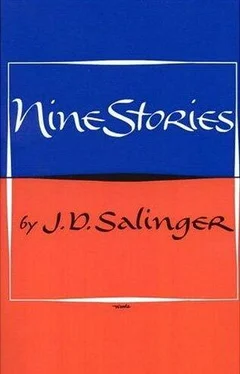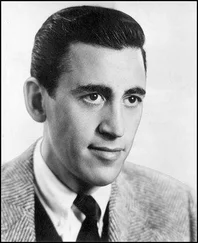Jerome Salinger - Nine Stories
Здесь есть возможность читать онлайн «Jerome Salinger - Nine Stories» весь текст электронной книги совершенно бесплатно (целиком полную версию без сокращений). В некоторых случаях можно слушать аудио, скачать через торрент в формате fb2 и присутствует краткое содержание. Год выпуска: 1953, Издательство: Little Brown, Жанр: Классическая проза, на английском языке. Описание произведения, (предисловие) а так же отзывы посетителей доступны на портале библиотеки ЛибКат.
- Название:Nine Stories
- Автор:
- Издательство:Little Brown
- Жанр:
- Год:1953
- ISBN:нет данных
- Рейтинг книги:4 / 5. Голосов: 2
-
Избранное:Добавить в избранное
- Отзывы:
-
Ваша оценка:
- 80
- 1
- 2
- 3
- 4
- 5
Nine Stories: краткое содержание, описание и аннотация
Предлагаем к чтению аннотацию, описание, краткое содержание или предисловие (зависит от того, что написал сам автор книги «Nine Stories»). Если вы не нашли необходимую информацию о книге — напишите в комментариях, мы постараемся отыскать её.
Nine Stories — читать онлайн бесплатно полную книгу (весь текст) целиком
Ниже представлен текст книги, разбитый по страницам. Система сохранения места последней прочитанной страницы, позволяет с удобством читать онлайн бесплатно книгу «Nine Stories», без необходимости каждый раз заново искать на чём Вы остановились. Поставьте закладку, и сможете в любой момент перейти на страницу, на которой закончили чтение.
Интервал:
Закладка:
“Hey, Selena…”
“What?” asked Selena, who was busy feeling the floor of the cab with her hand. “I can’t find the cover to my racket!” she moaned.
Despite the warm May weather, both girls were wearing topcoats over their shorts.
“You put it in your pocket,” Ginnie said. “Hey, listen—”
“Oh, God! You’ve saved my life!”
“Listen,” said Ginnie, who wanted no part of Selena’s gratitude.
“What?”
Ginnie decided to come right out with it. The cab was nearly at Selena’s street. “I don’t feel like getting stuck for the whole cab fare again today,” she said. “I’m no millionaire, ya know.”
Selena looked first amazed, then hurt. “Don’t I always pay half?” she asked innocently.
“No,” said Ginnie flatly. “You paid half the first Saturday. Way in the beginning of last month. And since then not even once. I don’t wanna be ratty, but I’m actually existing on four-fifty a week. And out of that I have to—”
“I always bring the tennis balls, don’t I?” Selena asked unpleasantly.
Sometimes Ginnie felt like killing Selena. “Your father makes them or something,” she said. “They don’t cost you anything. I have to pay for every single little—”
“All right, all right,” Selena said, loudly and with finality enough to give herself the upper hand. Looking bored, she went through the pockets of her coat. “I only have thirty-five cents,” she said coldly. “Is that enough?”
“No. I’m sorry, but you owe me a dollar sixty-five. I’ve been keeping track of every—”
“I’ll have to go upstairs and get it from my mother. Can’t it wait till Monday? I could bring it to gym with me if it’d make you happy.”
Selena’s attitude defied clemency.
“No,” Ginnie said. “I have to go to the movies tonight. I need it.”
In hostile silence, the girls stared out of opposite windows until the cab pulled up in front of Selena’s apartment house. Then Selena, who was seated nearest the curb, let herself out. Just barely leaving the cab door open, she walked briskly and obliviously, like visiting Hollywood royalty, into the building. Ginnie, her face burning, paid the fare. She then collected her tennis things—racket, hand towel, and sun hat—and followed Selena. At fifteen, Ginnie was about five feet nine in her 9-B tennis shoes, and as she entered the lobby, her self-conscious rubber-soled awkwardness lent her a dangerous amateur quality. It made Selena prefer to watch the indicator dial over the elevator.
“That makes a dollar ninety you owe me,” Ginnie said, striding up to the elevator.
Selena turned. “It may just interest you to know,” she said, “that my mother is very ill.”
“What’s the matter with her?”
“She virtually has pneumonia, and if you think I’m going to enjoy disturbing her just for money …” Selena delivered the incomplete sentence with all possible aplomb.
Ginnie was, in fact, slightly put off by this information, whatever its degree of truth, but not to the point of sentimentality. “I didn’t give it to her,” she said, and followed Selena into the elevator.
When Selena had rung her apartment bell, the girls were admitted—or rather, the door was drawn in and left ajar—by a colored maid with whom Selena didn’t seem to be on speaking terms. Ginnie dropped her tennis things on a chair in the foyer and followed Selena. In the living room, Selena turned and said, “Do you mind waiting here? I may have to wake Mother up and everything.”
“O.K.,” Ginnie said, and plopped down on the sofa.
“I never in my life would’ve thought you could be so small about anything,” said Selena, who was just angry enough to use the word “small” but not quite brave enough to emphasize it.
“Now you know,” said Ginnie, and opened a copy of Vogue in front of her face. She kept it in this position till Selena had left the room, then put it back on top of the radio. She looked around the room, mentally rearranging furniture, throwing out table lamps, removing artificial flowers. In her opinion, it was an altogether hideous room—expensive but cheesy.
Suddenly, a male voice shouted from another part of the apartment, “Eric? That you?”
Ginnie guessed it was Selena’s brother, whom she had never seen. She crossed her long legs, arranged the hem of her polo coat over her knees, and waited.
A young man wearing glasses and pajamas and no slippers lunged into the room with his mouth open. “Oh. I thought it was Eric, for Chrissake,” he said. Without stopping, and with extremely poor posture, he continued across the room, cradling something close to his narrow chest. He sat down on the vacant end of the sofa. “I just cut my goddam finger,” he said rather wildly. He looked at Ginnie as if he had expected her to be sitting there. “Ever cut your finger? Right down to the bone and all?” he asked. There was a real appeal in his noisy voice, as if Ginnie, by her answer, could save him from some particularly isolating form of pioneering.
Ginnie stared at him. “Well, not right down to the bone,” she said, “but I’ve cut myself.” He was the funniest-looking boy, or man—it was hard to tell which he was—she had ever seen. His hair was bed-dishevelled. He had a couple of days’ growth of sparse, blond beard. And he looked-well, goofy. “How did you cut it?” she asked.
He was staring down, with his slack mouth ajar, at his injured finger. “What?” he said.
“How did you cut it?”
“Goddam if I know,” he said, his inflection implying that the answer to that question was hopelessly obscure. “I was lookin’ for something in the goddam wastebasket and it was fulla razor blades.”
“You Selena’s brother?” Ginnie asked.
“Yeah. Christ, I’m bleedin’ to death. Stick around. I may need a goddam transfusion.”
“Did you put anything on it?”
Selena’s brother carried his wound slightly forward from his chest and unveiled it for Ginnie’s benefit. “Just some goddam toilet paper,” he said. “Stopsa bleeding. Like when you cut yourself shaving.” He looked at Ginnie again. “Who are you?” he asked. “Friend of the jerk’s?”
“We’re in the same class.”
“Yeah? What’s your name?”
“Virginia Mannox.”
“You Ginnie?” he said, squinting at her through his glasses. “You Ginnie Mannox?”
“Yes,” said Ginnie, uncrossing her legs.
Selena’s brother turned back to his finger, obviously for him the true and only focal point in the room. “I know your sister,” he said dispassionately. “Goddam snob.”
Ginnie arched her back.
“Who is?”
“You heard me.”
“She is not a snob!”
“The hell she’s not,” said Selena’s brother.
“She is not!”
“The hell she’s not. She’s the queen. Queen of the goddam snobs.”
Ginnie watched him left up and peer under the thick folds of toilet paper on his finger.
“You don’t even know my sister.”
“Hell I don’t.”
“What’s her name? What’s her first name?” Ginnie demanded.
“Joan… . Joan the Snob.”
Ginnie was silent. “What’s she look like?” she asked suddenly.
No answer.
“What’s she look like?” Ginnie repeated.
“If she was half as good-looking as she thinks she is, she’d be goddam lucky,” Selena’s brother said. This had the stature of an interesting answer, in Ginnie’s secret opinion.
“I never heard her mention you,” she said.
“That worries me. That worries hell outa me.”
“Anyway, she’s engaged,” Ginnie said, watching him. “She’s gonna be married next month.”
“Who to?” he asked, looking up.
Ginnie took full advantage of his having looked up. “Nobody you know.”
Читать дальшеИнтервал:
Закладка:
Похожие книги на «Nine Stories»
Представляем Вашему вниманию похожие книги на «Nine Stories» списком для выбора. Мы отобрали схожую по названию и смыслу литературу в надежде предоставить читателям больше вариантов отыскать новые, интересные, ещё непрочитанные произведения.
Обсуждение, отзывы о книге «Nine Stories» и просто собственные мнения читателей. Оставьте ваши комментарии, напишите, что Вы думаете о произведении, его смысле или главных героях. Укажите что конкретно понравилось, а что нет, и почему Вы так считаете.











